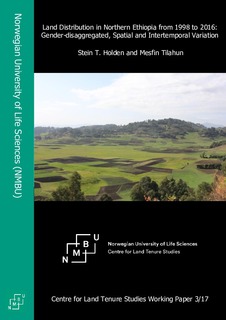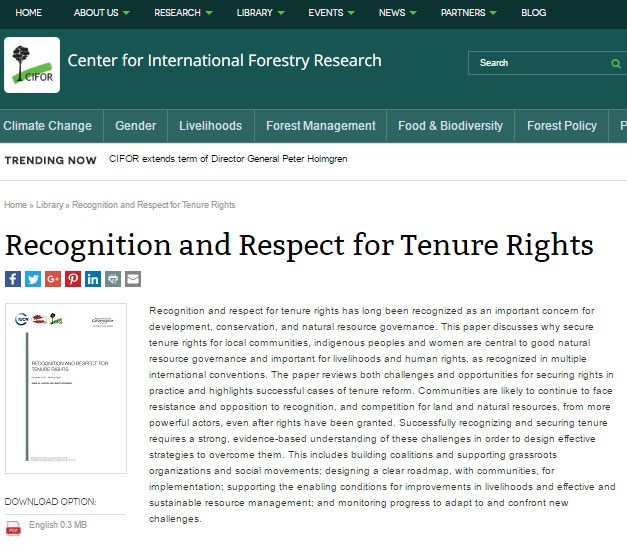Improving gender equity in irrigation: application of a tool to promote learning and performance in Malawi and Uzbekistan
This paper provides a brief synthesis of research conducted on gender in irrigation, and the tools and frameworks used in the past to promote improvement for women in on-farm agricultural water management. It then presents results from the pilot of the Gender in Irrigation Learning and Improvement Tool (GILIT) in locations in Malawi and Uzbekistan in 2015.
“Everything We Do Is Democracy”: Women and Youth in Land Rights Social Mobilization in Cambodia
Cambodian human rights organizations estimate that more than half a million people have been affected by land rights issues. Land conflict in Cambodia is a clear manifestation of structural violence affecting communities which are almost exclusively low income and home to indigenous and ethnic minorities. This article explores the complex interplay of actors, particularly women and youth, in land rights social mobilization (LRSM) in Cambodia, focusing on urban Boeung Kak Lake and rural Areng Valley.
In harm's way: Women human rights defenders in Thailand
ABSTRACTED FROM INTRODUCTION: Women Human Rights Defenders (WHRDs) in Thailand make a vital contribution to the advancement of human rights and are in urgent need of recognition and protection. Since the May 2014 coup, they have increasingly become at risk of violence, discrimination, and other violations of their human rights. Women have been systematically excluded from public consultations and decision-making processes, particularly on issues related to land and natural resources.
Land distribution in Northern Ethiopia from 1998 to 2016 : gender-disaggregated, spatial and intertemporal variation
This study utilizes land registry data from the First and Second Stage Land Registration Reforms that took place in 1998 and 2016 in sampled districts and communities in Tigray region of Ethiopia. Tigray was the first region to implement low-cost land registration and certification in Ethiopia and providing household level land certificates in the names of household heads. Second Stage Land Registration and Certification (SSLRC) is scaled up since 2015 and provides households with parcel-based certificates with maps. The SSLR&C lists all holders of parcels by name and gender.
Policy brief comparing state and traditional land justice systems in Uganda
This report outlines administrative ways to harmonise state and traditional institutions in terms of land justice in Uganda. Customary justice within the traditional clan system in Uganda offers big advantages over the state judicial system in terms of physical access and costs. A significant weakness of the state justice system is the heavy backlog of land related cases in courts. Perception of and experiences of corruption in the state judicial system are rife.
The Relation between Large-Scale Land Acquisitions and Rural Households: Evidence from Ethiopia and Tanzania
markdownabstractThe aim of the thesis is to understand the impact of large-scale foreign land acquisitions on rural households. The rapid expansion of large-scale land acquisition (LSLA) by foreign investors in developing countries over the past 10 years has precipitated a heated debate over the impacts on rural households in the recipient regions. LSLA brings often much-needed investment to agriculture in developing countries, potentially raising productivity, and creating rental and labour opportunities from which rural households can benefit.
Resolución Nº 464 de 2017 – Por la cual se adoptan los Lineamientos estratégicos de política pública para la Agricultura Campesina, Familiar y Comunitaria y se dictan otras disposiciones.
Los Lineamientos estratégicos de política pública para la Agricultura Campesina, Familiar y Comunitaria (ACFC) son un instrumento de política pública, de alcance nacional, cuyo objetivo es fortalecer las capacidades sociales, económicas y políticas de las familias, comunidades y organizaciones de ACFC, sobre la base de un desarrollo rural con enfoque territorial que mejore la sostenibilidad de la producción agropecuaria y genere bienestar y buen vivir de la población rural.
Femmes et terres en république de Guinée
Recognition and Respect for Tenure Rights
Recognition and respect for tenure rights has long been recognized as an important concern for development, conservation, and natural resource governance. This paper discusses why secure tenure rights for local communities, indigenous peoples and women are central to good natural resource governance and important for livelihoods and human rights, as recognized in multiple international conventions. The paper reviews both challenges and opportunities for securing rights in practice and highlights successful cases of tenure reform.
Debate en línea. Género y tierra en América Latina. Situación de las mujeres rurales y su lucha por la tierra
Sulá Batsú y Land Portal llevaron a cabo, a través de Anacaonas.net y LandPortal.info, el debate en línea Género y Tierra, el cual constituyó un espacio para reflexionar acerca del derecho, la tenencia y el uso de la tierra; profundizando en el análisis crítico sobre si el derecho a la tierra asegura el empoderamiento, y discutiendo acerca del papel de la mujer como protectora de la tierra y apoderada para garantizar su sostenibilidad.
Power and Potential: A Comparative Analysis of National Laws and Regulations Concerning Women's Rights to Community Forests
Up to 2.5 billion people hold and use the world’s community lands, yet the tenure rights of women—who comprise more than half the population of the world’s Indigenous Peoples and local communities—are seldom acknowledged or protected by national laws.








